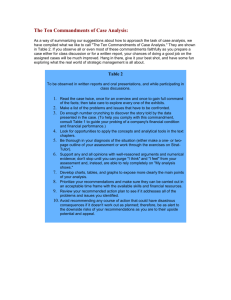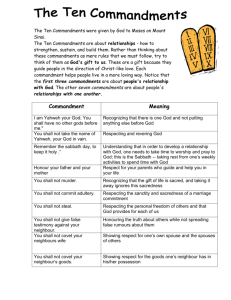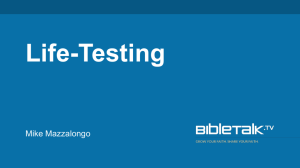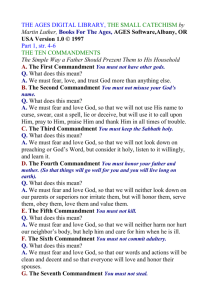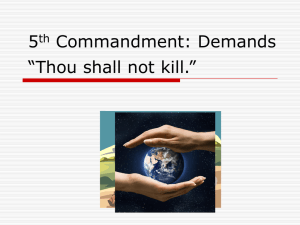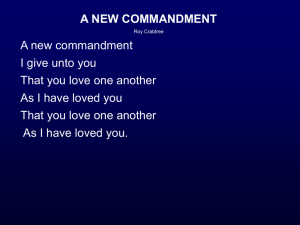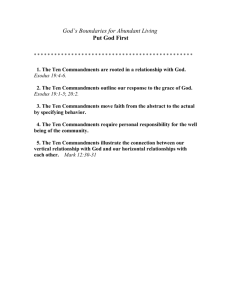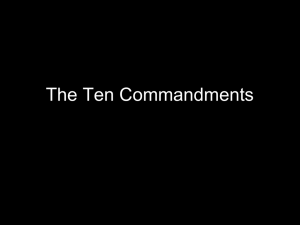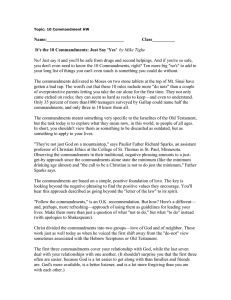Ord – Sunday 30 (A) Ex 22: 20-26 Mt. 22. 34-40
advertisement
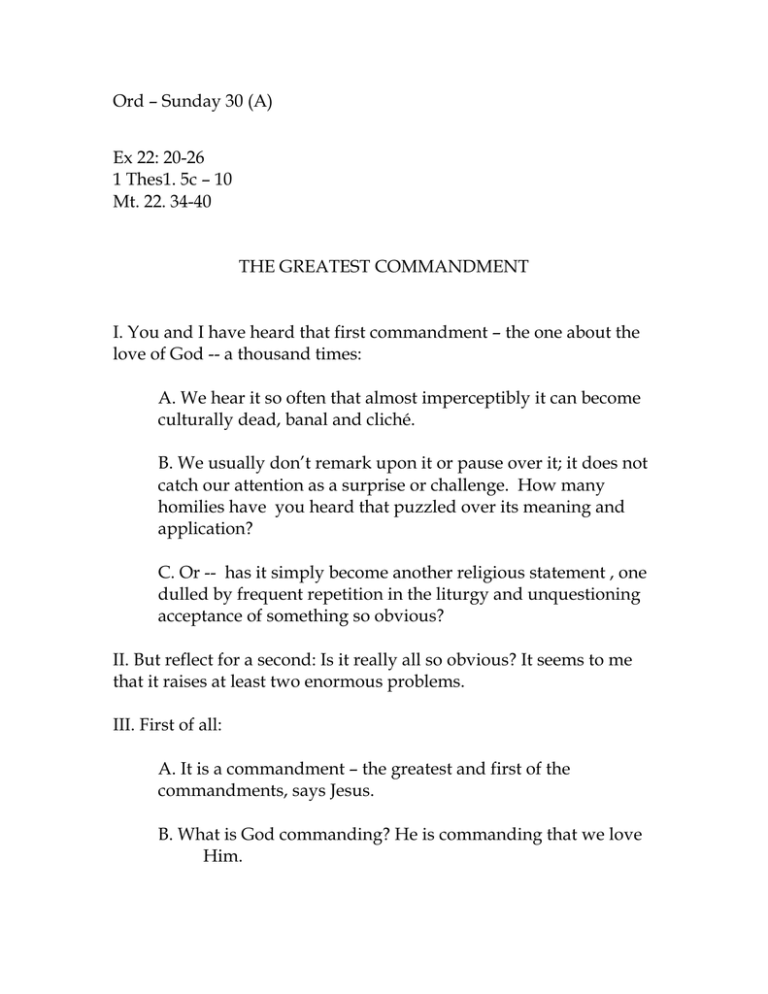
Ord – Sunday 30 (A) Ex 22: 20-26 1 Thes1. 5c – 10 Mt. 22. 34-40 THE GREATEST COMMANDMENT I. You and I have heard that first commandment – the one about the love of God -- a thousand times: A. We hear it so often that almost imperceptibly it can become culturally dead, banal and cliché. B. We usually don’t remark upon it or pause over it; it does not catch our attention as a surprise or challenge. How many homilies have you heard that puzzled over its meaning and application? C. Or -- has it simply become another religious statement , one dulled by frequent repetition in the liturgy and unquestioning acceptance of something so obvious? II. But reflect for a second: Is it really all so obvious? It seems to me that it raises at least two enormous problems. III. First of all: A. It is a commandment – the greatest and first of the commandments, says Jesus. B. What is God commanding? He is commanding that we love Him. C. But can you command someone to love you? 1. Can you tell someone/anyone that they has such an obligation? 2. Can you name as “love” – with all its echoes of spontaneity and freedom and attachment and emotion – something you command, something that will come about as a response to an order? IV. But even more – even more massive: the biggest problem for me is not that. The biggest problem is why it is commanded at all? What earthly difference can it make to God whether we love Him or not? PART TWO I. This wonder runs through two thousand years of Christian reflection. At the opening of his Confessions, for example, Augustine asked that same question of God Himself. A. The book has raised the problem he want to explore: How does one come to praise God? B. Then he begins the extensive history of his own life to find his answer to this problem. C. But before he does, he pauses and poses one more question to God – a question that is the introduction to his entire life: D. His question: “What am I to you, O my God, That you have commanded me to love you?” 1. “What am I to you . . . “ 2. Why does the unspeakably great God care one way or another? 2 3. What earthly difference can it make to God whether we love Him or not? III. A number of years ago, I was mulling over this question of Augustine while walking through a somewhat crowded park: And I was struck by the great diversity of people there: A. There were young children playing on the grass, old people watching them and conversing with their neighbors, teen-agers raising a great din and ruckus, a ball game beginning somewhere, police, businessmen and women, soldiers in uniform – in other words a sea of human beings. 1. Each of us possessing within ourselves his or her own world – our own dreams and our own futures – Like Thornton Wilders’ Our Town. 2. And as I wandered around, I kept asking God: Does it really make any difference to you whether these people know you or love you? 3. I don’t care if they know and love me. Why should you? B. And even more, You have commanded it – it is the highest and most urgent and most comprehensive of all of your commandments. It is your central wish. But everything inside of me asks: Why? Why? IV. It is not that you found us -- the human race -- so elevated, so enhanced, so pure and good that in a wave of recognition you loved us and wanted our love. A. The human race then and now has been the kind of compromised reality – even petty and sinful reality -- that one 3 encounters in daily life, in newspapers and business dealings, in the cruelties we visit on one another and in the wars and hatreds and ruthless exploitations that dominate so much of our history. B. And yet in this we hear the command of the Gospel and the question of Augustine: “What am I to You?” asks Augustine. Yes, indeed, what am I to you? C. And yet to us – through the centuries -- the voice continues to sound: You shall love the Lord your God, With all your heart, With all your soul, With all your mind This is the greatest and the first commandment. PART THREE I. It is the shema – the ancient Jewish prayer -- reaching back to the commands that formed the Jewish nation; A. “Love” here means a deep attachment, a supreme union, a profound involvement. B. And this love for God is to come out of “one’s whole being” – out of everything we are : with all of our “heart (center of knowing and willing as well as of feeling), with all of our mind and with all our soul (one’s whole life and energies).” [cf. Meiers 257] C. It is [1]to this comprehensive attachment that God calls us and [2] to command it, means that we are to bend everything to allow this love the supreme position in our lives 4 D. God is calling each of us to union with Himself: 1. But this is what we were made for; it is the final meaning of our lives. 2. All of God’s commandments come out of His love. 3. Here, in the greatest of the commandments, He is commanding what is the deepest desire of a human being. II. And why does He care – even command – that we love Him. A. Not because we are so good, but because He is good. The capacity to love, the drive to love, is in direct proportion to the goodness of the one loving. B. And we get some glimpse of God’s goodness – of that limitless goodness – when we see how much we mean to Him. C. Only the enormous goodness of God can bring it about that He loves us so deeply as to look for our love. III. Everything we have read in this morning’s liturgy comes out of this and extends it: A. For in calling us to Himself in love, God calls us to one another in love. B. In Exodus, God commands that we should not molest or oppress the immigrant. That we should not lend money at interest to the poor or act like an extortioner. Love touches on 5 all of these, the least of human beings. “And if they cry out to me, ”He says, “I will hear them. For I am compassionate.” C. And in the Gospel itself , we are told that our love for one another is to be modeled on the love we are to have for God. D. And so the Opening Prayer of this Mass begged of God: “Strengthen our faith to accept your covenant And give us the love to carry out your command.” 6
